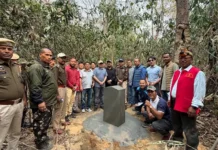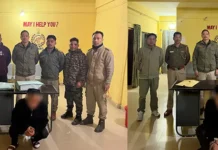CHANGLANG, 5 Oct: Four indigenous community-based organisations (CBOs) – the Tutsa Welfare Society, Jugli Mung, Muklom Welfare Society, and Muklom Youth Association – have jointly demanded that fresh consultative meetings be held before proceeding with the proposed bifurcation of Changlang district and creation of a new district named Rima with its headquarters in Miao.
In a joint representation, the organisations expressed concern that the resubmission of the bifurcation proposal on 15 September by the deputy commissioner of Changlang to the state government through the DA secretary was carried out “without adequate consultation or consent from the indigenous tribal communities who have historically and culturally inhabited the region.”
While acknowledging that administrative reorganisation aims to improve governance and service delivery, the organisations cautioned that “any bifurcation exercise must not come at the cost of tribal unity, representation, and constitutional safeguards.”
The four CBOs said that no meaningful dialogue hasbeen held with the affected stakeholders, describing the process as one that “undermines democratic values and participatory governance.” They emphasised that a decision of such magnitude should be taken only after thorough deliberation and broad-based consensus among all affected communities.
Highlighting key points from their representation, the groups raised concerns over the lack of public consultation, the risk of cultural fragmentation, and the demographic marginalisation of scheduled tribe (ST)populations in the proposed Rima district.
They pointed out that the proposed new district, comprising Diyun, Bordumsa, Miao, and Kharsang, has a significantly smaller proportion of ST population, which could expose indigenous groups to “political, economic, and social disadvantages.”
The organisations further noted that Changlang already has a well-established administrative framework, with ADC, SDO, and CO offices functioning across its circles and subdivisions to ensure accessible local governance. They added that improved all-weather road connectivity has made administrative services more reachable, thereby weakening the logistical justification for creating a new district.
Calling on the administration to withhold further action on the bifurcation proposal, the CBOs urged the DC to initiate “fresh, transparent, and inclusive consultations” with all affected communities.
“Only through an open and participatory dialogue can a balanced and sustainable decision be achieved that upholds the unity and long-term interests of the indigenous people of Changlang,” the representation stated.


